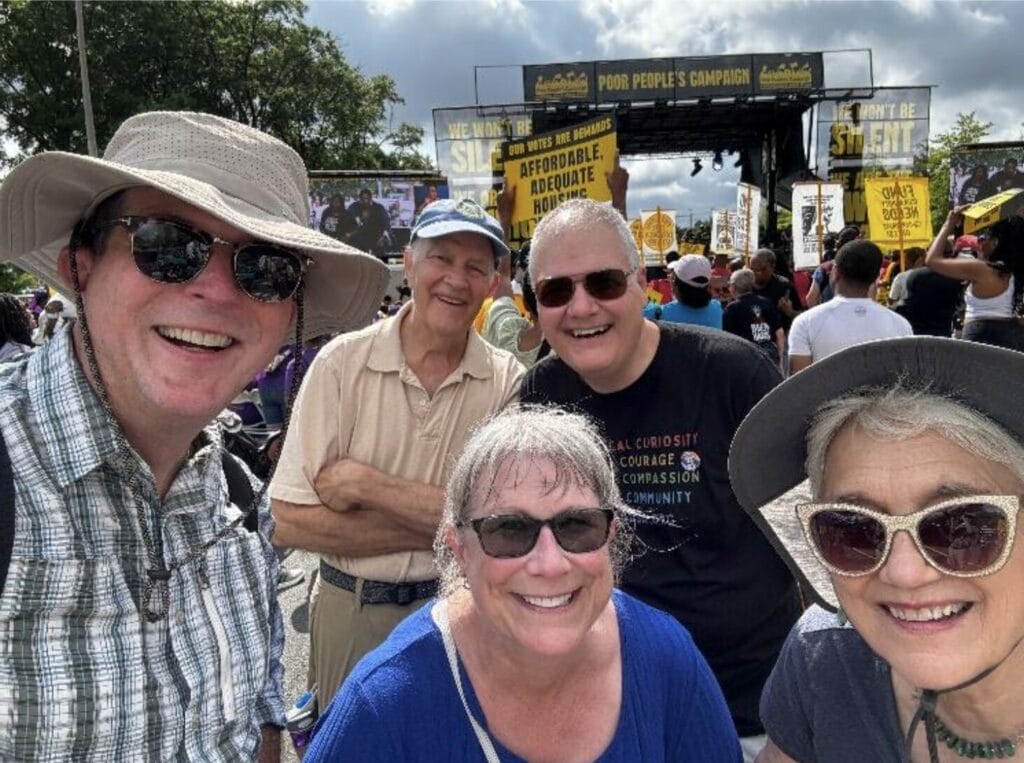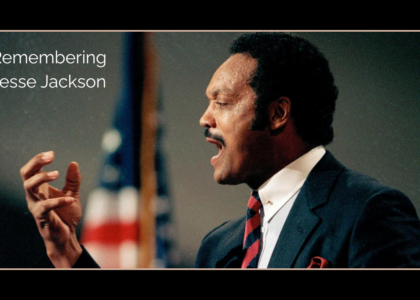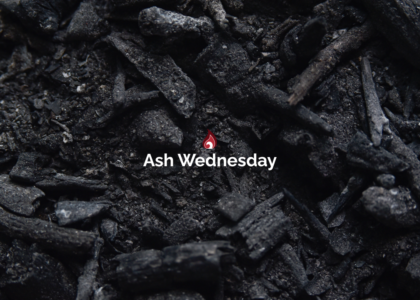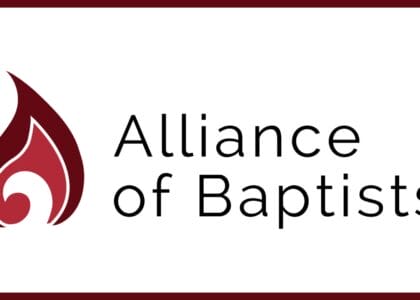by James Lamkin
When I heard about an all-night bus ride leaving Asheville, NC, on May 28, 2024, for an all day, next day, hot day in Washington, DC, for a Poor People’s Campaign, I immediately booked a seat and said, “Count me in!”
I just had to go. Why? Because I am an heir, a beneficiary of a bigger story. A story that I had to go back to the future to tell.
Unlike the movies, my time travel did not involve an 88-mile-an-hour Delorian. No Flux Capacitor fueled by 1.21 jigowatts of plutonium. No Marty McFly, Dr. Emmitt Brown, or Steven Spielberg. It was much more.
The Poor People’s Campaign 2024 involved busloads of justice-seeking folk from all over. Plus, we had Rev. William Barber, prophet extraordinaire, right there on Constitution Avenue, reminding us: “In this upcoming election, poor people ARE the swing vote.” Like the sweet chariot, “Let’s swing low,” he said. Like the gospel song, “Let’s press on to higher ground,” he said. “Amen,” we said; but our voices were an echo, resonating back to 1968.
1968 was a tough year. It rang in with the horrific images of the Tet Offensive in Vietnam. Then, Apollo 8 live-televised an Earthrise—a picture of our fragile planet peeping over the moon’s cratered horizon and described by Carl Sagan’s mellow baritone as a “lonely speck in the cosmic dark.” Then, just before Palm Sunday, a rifle shot rang out and dark blood pooled on the balcony of the Lorraine Motel while Lady Liberty wept. A month later, a bright-faced presidential hopeful, Robert F. Kennedy, was on the floor of the Ambassador Hotel also murdered by an assassin’s bullet. By summer’s end, Olympians, Tommie Smith and John Carlo, bowed their heads, raised their fists, and affirmed Black Power while receiving their medals. By Thanksgiving, Nixon had been elected president—1968 was a tough year.
Yet, there was something else. Though April ’68 had come and gone and taken The Dreamer with it, MLK’s dream was still alive. Like Narnia’s Aslan, Justice was on the move.
The Poor People’s Campaign had been in the planning stages, but some said it should be canceled—the year had been tragic enough. However, Ralph Abernathy and Coretta Scott King said, “March on!” And they did in June 1968.
With thousands on their way to Washington, the Southern Christian Leadership Conference (SCLC) appealed for DC area congregations to allow participants to use their church buildings for temporary, emergency housing. According to Mahan Siler, only two Northern Virginia churches said yes: a Presbyterian church and Ravensworth Baptist Church which later became one of the first Alliance of Baptists congregations!
In 1968, Mahan was the third pastor of Ravensworth in Annandale, VA. I came along years later as the fifth pastor (1992-97). However, even then, the lore and legacy of the church’s connection to the Poor People’s March lingered.
The church’s minutes of the May 29, 1968, “Special” Business Meeting tell of Mahan presenting the SCLC request. Deacon chair, AP Mustain, offered a statement, as did the chair of the Social Action Committee, William Clemmer. The church clerk, Ina Lintz, recorded the motion and the vote: “That Ravensworth Baptist Church accept an opportunity represented by participation in the Poor People’s Campaign to the extent of providing temporary institutional facilities; further, that the Deacons administer this participation.” Eighty members were present: 44 voted yes. 20 said no. The motion passed. The meeting adjourned.
But not exactly.
At day’s end, following an all-night ride back to Asheville, we arrived at 5:00 am Sunday morning—just in time to get ready and go to church. I returned home washed—a time traveler who had gone back to the future—baptized in the ageless river of justice that rolls down like waters. Over the prior 36 hours, I had told the tale of the adapted baptistry so many times my face hurt from smiling.
After the vote, Floyd Harris, a charter member and leading layperson in the church, noted there were no shower facilities in the building, only sinks and toilets. He believed hospitality for the travelers demanded more. Floyd owned a large plumbing company. Mahan described him as, “a conservative with a big heart.” Floyd volunteered, “I can move the faucet from the side of the baptistry to several feet higher on the wall. We’ll hang a curtain in front and turn the baptistry into a shower!” And he did just that.
Baptist improvisation. Mahan added, “Not knowing how he voted, I suspected it was ‘No,’ which makes his active, compassionate response all the more amazing.”
Years later, I rubbed my hand on the baptistry wall, feeling for the shower’s stigma. I never found it. Perhaps remodeling and maintenance over the years erased it. I began to think of the “legend of the converted baptistry” as helisgeschichte—a holy history proclaiming more about the story of a people’s saving faith than actual fact.
But thank God for Mahan Siler (an oft-repeated Alliance mantra). He verified the Baptist replumbing and delighted in its retelling and how the 2024 Poor People’s Campaign is one of those back to the future, time travel moments.
When the morning dawned on May 29, 2024, we bus-folk were sleepy but glad to stand shoulder to shoulder on Constitution Avenue, near where a mob assaulted the Capitol building and police on January 6, 2021, in an attempted insurrection. We were siding with the 140 million people in the country who are impacted by the interlocking injustices of systemic racism, poverty, ecological devastation, militarism, and the false narrative of Christian nationalism. Rev. William Barber contrasted what we were up to: “We are not an insurrection,” said he, recalling the mob violence on the same spot, “we are a moral resurrection.”
Beside me stood a friend, Kelley Griffith, with whom I attend church at Grace Covenant Presbyterian in Asheville. Guess what? Kelley’s parents were charter members of Ravensworth Baptist Church! In fact, their picture hangs in the church’s hallway of laypeople with shovels in hand at the building’s groundbreaking in the early ‘60s. Alongside them in the photo is the improvisational plumber, Floyd Harris!
At day’s end, following an all-night ride back to Asheville, we arrived at 5:00 am Sunday morning—just in time to get ready and go to church. I returned home washed—a time traveler who had gone back to the future—baptized in the ageless river of justice that rolls down like waters. Over the prior 36 hours, I had told the tale of the adapted baptistry so many times my face hurt from smiling.
It is one heck of a story—a feisty bunch of Baptists, bivouacked in the southwest corner of the Capital Beltway, fretting over “how do we help with what we have?” Then, actually doing something, for God’s sake and for a few sweaty, justice-seeking pilgrims.
Seems to me the Alliance congregation of Ravensworth Baptist Church is still doing it, now pastored by Rev. Dr. Leah Grundset Davis. She and they are still doing the work of sharing love, doing justice, and building community—tasks, not only of the past, but of God’s good future.

James Lamkin has been connected with the Alliance of Baptists since 1990. His wife Rev. Liz Harris-Lamkin was the first military chaplain endorsed by the Alliance. James retired from Northside Drive Baptist Church in Atlanta, Ga., after serving as pastor for 23 years. He also served as pastor of Ravensworth Baptist Church in Annandale, Virginia for five years in the ‘90s. James has a son and a daughter and four grandkids.




Recent Comments